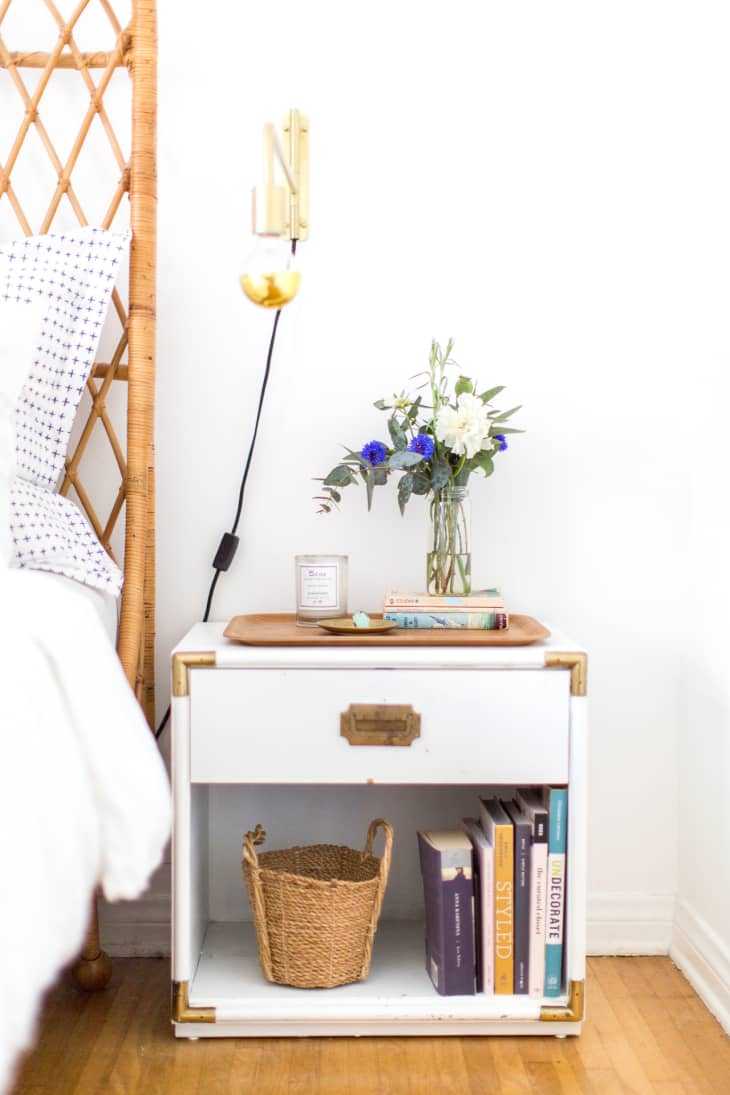You’ve just finished brushing your teeth and changing into your sleepwear of choice, and you’re ready to get into bed. Once under the covers, before settling in for a direct transport to dreamland, you reach for something on your nightstand—what is it?
If your answer is “my phone,” you’re not alone. Looking at your mobile device before bed is incredibly common among U.S. adults and teenagers, and multiple studies have shown that an overwhelming majority of people even sleep with their phone in bed at night. While that little electronic brick can be a source of connection or entertainment, it’s also a portal into the relentless news cycle, which has been exceptionally stressful amid both the coronavirus pandemic and the presidential election. What’s meant to be a quick Twitter or Instagram scan can easily turn into a 30-minute trip down a worst-case-scenario rabbit hole, leaving you feeling anxious and on edge, and not at all relaxed for sleep.
It’s no wonder this phenomenon has acquired the name “doomscrolling,” a word that has existed for a few years and was popularized this year by Quartz reporter Karen Ho . As Ho explained to Fast Company earlier this summer, “We’re in a pandemic that is historic. The recession is historic. And we have these protests that are historic. It’s about feeling a loss of a sense of active control over the time you’re spending gathering this information or observing content. I think calling it ‘doom’ is pretty fair.”
Like many other habits, that nonstop scroll into the what-if abyss isn’t great for your health, and can be challenging to stop without concrete strategies. Fortunately, there are steps you can take to find your way out of the routine pattern and into a better night’s sleep. Ahead, learn more about why doomscrolling is so tempting, why it’s pretty much the worst thing for your brain, and what you can do instead.

Why do we doomscroll anyway?
It turns out that doomscrolling is actually pretty normal—in fact, it might be hard-wired into our brains, explains Azadeh Ghafari, a California-based psychotherapist known as @the.wellness.therapist on Instagram. “As humans, we have an instinctive desire to be on alert for danger,” she tells Apartment Therapy. “It’s how we’ve survived for centuries. Today, during a time filled with immense uncertainty, there’s a desire to search for information in order to feel more in control.”
Uncertainty is arguably the theme of 2020, between a pandemic with seemingly no end in sight and an election whose result may not be clear when we all go to bed on Nov. 3. Of course, knowing who won the election on Election Day itself is still a relatively new concept given technology , but now that we know we can access that information, it’s hard to avoid seeking it—and that probably involves hitting refresh on a website or social media app dozens of times. Something that starts as a quest for control can soon spiral out of control, as Ho noted.
“When we doomscroll, our bodies are in a constant state of fight-or-flight,” Ghafari explains, adding that it’s very hard to find an off switch and go into planning mode if we’re incessantly bombarded by headlines and a 24/7 news cycle. “This creates a permanent state of being anxious and on alert, which impacts the body in multiple negative ways, because our nervous system is never given any time to relax.”
Doomscrolling before bed sets the groundwork for a bad night’s sleep.
Generally speaking, any sort of electronic “blue light” intake at night can disrupt the sleep you get that night, and using your phone before bed has been linked to all sorts of sleep and health challenges. Unsurprisingly, a 2020 study published in the journal PLOS One concluded that participants who restricted phone use before bed for four weeks were able to fall asleep faster, while experiencing better sleep quality and working memory.
And that’s just using your phone at all . As Ghafari notes, doomscrolling creates a particular set of sleep problems because it causes people to start the sleep process from a heightened state of alertness, stress, and anxiety.
“2020 is a very unique year,” she explains, adding that many of us are already experiencing anxiety and loneliness on a regular basis, and those feelings are exacerbated when we doomscroll. “Folks are waking up even more exhausted and stressed than they were before they went to bed. It’s not just about the inability to fall asleep; it’s about the quality of sleep people are getting. Patients will say to me, ‘I wake up and I feel depressed,’ even if there’s nothing specific they are struggling with that week. I always ask: ‘What were you looking at before you went to bed?’”
If you want to stop doomscrolling (or at least cut back), start with crafting a brand-new bedtime routine.
The goal of any bedtime routine should be to prepare your body for sleep—meaning, you’ll want to arrive at a state of relaxation and calmness. Ghafari points out that this will look different for everyone, but it’s beneficial to have a general goal of moving away from the things you’ve been doing during the day. “Rest doesn’t just happen while you’re sleeping,” she says. “It’s in the hours before that, too.”
As for the steps of your bedtime routine, that’s entirely up to you. “For some people, it might include doing nighttime stretches, or dimming the lights; other folks might want to use essential oils and a humidifier,” Ghafari says, noting that mindful breathing and meditation are also great strategies, and there are plenty of apps to help you along. Coloring , reading, taking a bath, or journaling are also great relaxation tools that can replace your nightly scroll.
Whatever your bedtime routine looks like, Ghafari emphasizes the benefits of creating an individual ritual around sleep. “It’s your time, and your bedroom,” she explains. “Create an environment for yourself that allows your bed to be a safe space where you can rest and let go of the day.”
And if you’re having trouble being away from your phone, there are ways to deal.
The average cell phone user might tap, swipe, or click their screen over 2,000 times a day—it’s almost instinctive for some folks. And with screen time increasing for many people of all ages during the pandemic, cutting back can be a challenge.
For this reason, Ghafari doesn’t suggest trying to quit your nightly scroll cold turkey. Instead, she advises to take baby steps. “If you catch yourself spending an hour on your phone before bed, cut it down to 45 minutes,” she says, noting that you can set timers on your phone to limit your app usage. “From there, get it down to 30 minutes. Then 15.”
Ghafari also poses the idea of doing a “body scan” when you find yourself scrolling absentmindedly—think about each of your body parts individually, and take note of how they feel, one at a time. “Do you feel tension anywhere? Does your chest feel tight? Is your forehead in a wrinkle? If the answer is yes, it might be time to stop.”
If you find yourself starting the day with a doomscroll, consider investing in an actual alarm clock instead of your phone’s built-in app to avoid the temptation of flipping through your apps first thing in the morning, which is a guaranteed time-suck. “We’re so addicted to looking at our phones that it takes a lot of training to stop,” Ghafari points out. “Something I teach my patients is to come up with a plan that works for you, where you tell yourself that you’ll only look at Instagram or Twitter in certain spaces. That way, you’re breaking up the habit of mindlessly checking apps, and you create a designated setting within which to do it.”
If the news has you feeling overwhelmed, try channeling your emotions into action.
Although it’s common to consume news nonstop in order to gain a sense of control, you’ll rarely end up finding it on your feed. Instead of filling your brain with information that’s only going to stress you out, consider finding ways to really take action. Ghafari put this into practice herself this year by using her Instagram to organize for Joe Biden’s presidential campaign. You can also set your sights on a social justice cause that speaks to your heart by volunteering with an organization in your area; donating money, time, or a skill; or boosting important causes on your own social media feeds.
“There’s so much out there,” she says, urging folks to find a meaningful cause that speaks to them. “And if you’re using social media, try building new friendships online. So many of us are experiencing this year in isolation, and we are seeking deeper connections. This is a time to get involved in that, whether it’s through a Facebook group, or a virtual mommy and me class, or a group for millennials who love plants—whatever! The more you bring a sense of control into your life, you’re going to feel—and sleep—better.”








